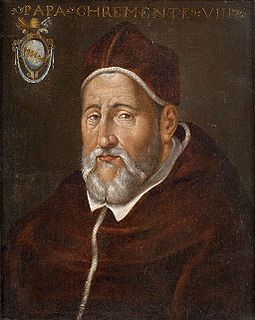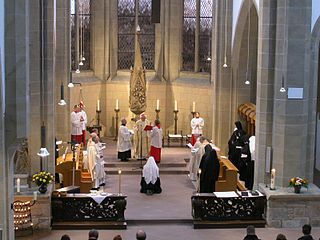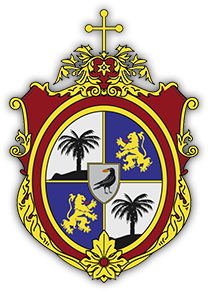Description
This constitution marked a distinct departure from the Tridentine law. It differed both as to the necessary age and other requirements for admission of men to solemn vows in orders, congregations, and institutes in which solemn vows were prescribed. The immediate occasion of its promulgation was the settlement, once and forever, of doubts which had arisen and been presented to the Holy See about the validity of solemn vows made without due observance of the decree Neminem Latet, i.e. without the three years' profession of simple vows.

The Council of Trent, held between 1545 and 1563 in Trent, was the 19th ecumenical council of the Catholic Church. Prompted by the Protestant Reformation, it has been described as the embodiment of the Counter-Reformation.
A religious congregation is a type of religious institute in the Catholic Church. They are legally distinguished from religious orders — the other major type of religious institute — in that members take simple vows, whereas members of religious orders take solemn vows.
A religious institute is a type of institute of consecrated life in the Catholic Church where its members take religious vows and lead a life in community with fellow members. Religious institutes are one of the two types of institutes of consecrated life; the other is that of the secular institute, where its members are "living in the world".
It said that the Neminem latet regulation was intended to safeguard the religious orders, congregations, and institutes from losing their genuine spirit and former excellence by hastily and imprudently admitting youths having no true vocation and youths whose lives, morals, and bodily and mental endowments had not been properly investigated and no testimonial had been requested of, or received from, the bishop of their native place, or of the places where they had sojourned for the year immediately preceding their admission to the house of postulants.
A bishop is an ordained, consecrated, or appointed member of the Christian clergy who is generally entrusted with a position of authority and oversight.
The Neminem latet decree accomplished this by decreeing that novices, after the completion of their probation and novitiate, should make profession of simple vows for the term of three full years. This also included clerics after reaching sixteen years old or older (prescribed by the Council of Trent), and lay brothers, the age fixed by Pope Clement VIII (in Suprema). After the completion of their term, to be computed from the day of profession to the last hour of the third year, and if found worthy, they were to be admitted to solemn profession. Their superiors, for just and reasonable cause, could postpone the solemn profession. Such postponement was prohibited beyond the twenty-fifth year of age, except in the orders and countries where a longer term of simple profession was conceded by special indult of the Holy See.

The novitiate, also called the noviciate, is the period of training and preparation that a Christian novice monastic, apostolic, or member of a religious order undergoes prior to taking vows in order to discern whether he or she is called to vowed religious life. It often includes times of intense study, prayer, living in community, studying the vowed life, deepening one's relationship with God, and deepening one's self-awareness. It is a time of creating a new way of being in the world. The novitiate stage in most communities is a two-year period of formation. These years are "Sabbath time" to deepen one's relationship with God, to intensify the living out of the community's mission and charism, and to foster human growth. The novitiate experience for many communities includes a concentrated program of prayer, study, reflection and limited ministerial engagement.

Pope Clement VIII, born Ippolito Aldobrandini, was Pope from 2 February 1592 to his death in 1605. Born in Fano, Italy to a prominent Florentine family, he initially came to prominence as a canon lawyer before being made a Cardinal-Priest in 1585. In 1592 he was elected Pope and took the name of Clement. During his papacy he effected the reconciliation of Henry IV of France to the Catholic faith and was instrumental in setting up an alliance of Christian nations to oppose the Ottoman Empire in the so-called Long War. He also successfully adjudicated in a bitter dispute between the Dominicans and the Jesuits on the issue of efficacious grace and free will. In 1600 he presided over a jubilee which saw a large number of pilgrimages to Rome. He had little pity for his opponents, presiding over the trial and execution of Giordano Bruno and implementing strict measures against Jewish residents of the Papal States. He may have been the first pope to drink coffee. Clement VIII died at the age of 69 in 1605 and his remains now rest in the Santa Maria Maggiore.
Pius IX said that, nevertheless, novices had been admitted to solemn profession without the three years of simple vows. This gave great cause for doubt concerning the validity of the solemn profession. A decision upon that matter was requested from the Holy See. As the Neminem latet decree said nothing about nullity of solemn profession made in opposition to its regulation, the solemn profession made without the prescribed three years of simple vows was valid, though illicit.
In this papal constitution, Pius IX declared:
We, therefore, in a matter of such great importance, desiring to remove all occasion of future doubt, of Our own motion and certain knowledge, and in the plenitude of Our Apostolic power as regards the religious communities of men of whatever order, congregation, or institution in which solemn vows are made, do determine and decree to be null and void and of no value the profession of solemn vows, knowingly or ignorantly, in any manner, colour or pretext, made by novices or lay brothers, who, although they had completed the Tridentine probation and novitiate, had not previously made profession of simple vows and remained in that profession for the entire three years, even though the superiors, or they, or both respectively, had the intention of admitting to, or making, solemn vows, and had used all the ceremonies prescribed for solemn profession.
Women were not included in this law. They, unless special indults were granted, followed the Tridentine regulation until Pope Leo XIII (3 May 1902, Decretum perpensis) enjoined on them the same profession of simple vows for three years prior to the solemn profession, under penalty of nullity.

Pope Leo XIII was head of the Catholic Church from 20 February 1878 to his death. He was the oldest pope, and had the third-longest confirmed pontificate, behind that of Pius IX and John Paul II.

A nun is a member of a religious community of women, typically living under vows of poverty, chastity, and obedience in the enclosure of a monastery. Communities of nuns exist in numerous religious traditions, including Buddhism, Christianity, Hinduism, Jainism, and Taoism.

In the Catholic Church, a religious order is a type of religious community characterised by its members professing solemn vows. According to the 1983 Code of Canon Law, they are classed as a type of religious institute.
In Catholic canon law, a solemn vow is a vow that the Church has recognized as such.
The term religious profession is used in many western-rite Christian denominations to refer to the solemn admission of men or women into a religious order by means of public vows.

Religious vows are the public vows made by the members of religious communities pertaining to their conduct, practices, and views.
The Missionaries of the Sacred Heart of Jesus are a missionary congregation in the Catholic Church. It was founded in 1854 by Servant of God Jules Chevalier(1824-1907) at Issoudun, France, in the Diocese of Bourges.
The Missionaries of Our Lady of La Salette are a religious congregation of priests and brothers in the Latin Church, one of the 23 sui iuris churches which make up the Catholic Church which is led by the Bishop of Rome. They are named after the apparition of Our Lady of La Salette in France. There is also a parallel religious community of sisters called the Missionary Sisters of Our Lady of La Salette. A lay fraternal group of associates also works in cooperation with the vowed religious. The Missionaries are dedicated to making known the message of Our Lady of La Salette, a call to healing of inner brokenness and personal reconciliation with God, especially as found in the first three commandments. The missionaries are popularly known as "the La Salettes."

Quo primum is the incipit of an Apostolic constitution in the form of a papal bull issued by Pope Pius V on 14 July 1570. It promulgated the 1570 edition of the Roman Missal, and made its use obligatory throughout the Latin Rite of the Catholic Church, except where there existed a different Mass liturgy of at least two hundred years' standing.

The Order of Saint Paul the First Hermit, known also simply as Pauline Fathers, is a monastic order of the Roman Catholic Church, founded in Hungary during the 13th century. Its post-nominal letters are O.S.P.P.E.

The Missionaries of the Company of Mary is a missionary religious congregation within the Catholic Church. The community was founded by Saint Louis de Montfort in 1705 with the recruitment of his first missionary disciple, Mathurin Rangeard. The congregation is made up of priests and brothers who serve both in the native lands and in other countries. The Montfortian Family comprises three groups: the Company of Mary, the Daughters of Wisdom and the Brothers of Saint Gabriel.

Michelangelo Celesia, O.S.B. Cas. was an Italian Benedictine monk who served as the Archbishop of Palermo from 1871 until his death, and was elevated to the cardinalate in 1884.
Ascendente Domino was a papal bull issued by Pope Gregory XIII, 24 May 1584, in favor of the Society of Jesus, to confirm the constitution of the Society, and the privileges already granted to it by Paul III, Julius III, Paul IV, and Pius V.
The theology of Pope Pius IX was very aware and convinced about the pontiff's role as the highest teaching authority in the Church.
Di diritto pontificio is the Italian term for “of pontifical right”. It is given to the ecclesiastical institutions either created by the Holy See or approved by it with the formal decree, known by its Latin name, Decretum laudis [“decree of praise”].

A religious sister in the Catholic Church is a woman who has taken public vows in a religious institute dedicated to apostolic works, as distinguished from a nun who lives a cloistered monastic life dedicated to prayer. Both nuns and sisters use the term "sister" as a form of address.
Catholic canon law is the set of rules and principles (laws) by which the Catholic Church is governed, through enforcement by governmental authorities. Law is also the field which concerns the creation and administration of laws.













